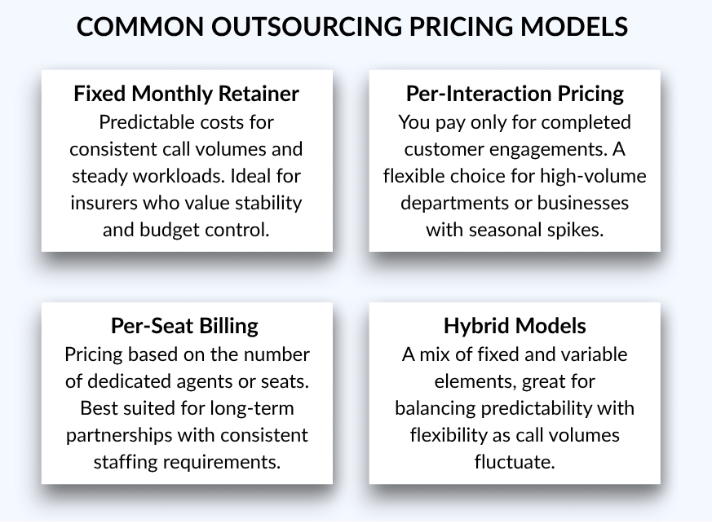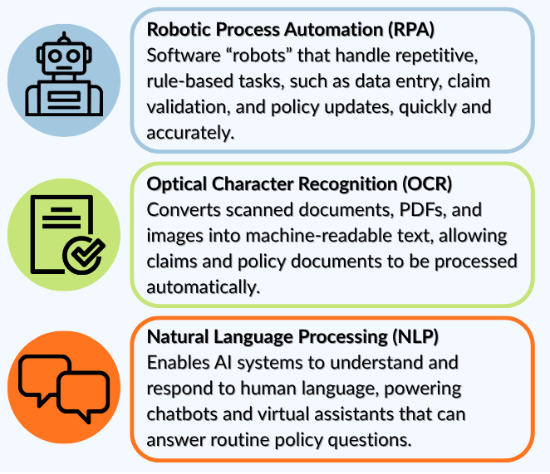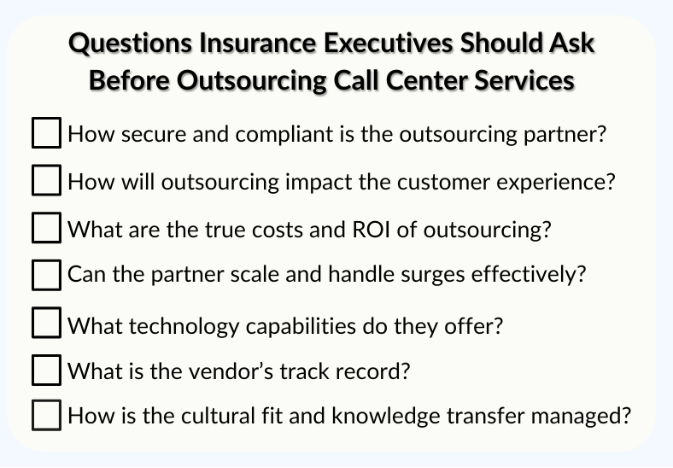Top Questions Insurance Executives Ask Before Outsourcing Call Center Services
Insurance executives considering outsourcing their call center operations focus on seven key areas: compliance, customer experience, cost and ROI, scalability, technology, reliability, and cultural fit. They want assurance that partners meet strict data security and regulatory standards, maintain policyholder satisfaction, and deliver measurable ROI beyond cost savings. Top-performing BPO partners offer scalable teams, AI-driven automation, seamless system integration, and a proven track record in the insurance industry. Success ultimately depends on choosing a provider that aligns with the company’s culture, communicates transparently, and operates as an extension of the brand.
Read Time: 8 minutes
Table of Contents
- 1. How Secure and Compliant Is the Outsourcing Partner?
- 2. How Will Outsourcing Impact Customer Experience (CX)?
- 3. What Are the True Costs and ROI of Outsourcing?
- 4. Can the Partner Scale and Handle Surges Effectively?
- 5. What Technology and Integration Capabilities Do They Offer?
- 6. What Is the Vendor's Track Record and Reliability?
- 7. How Is Cultural Fit and Knowledge Transfer Managed?
- Conclusion
In 2025, 78% of firms that outsource call center operations report cost savings, while only 71% say their quality expectations were met. For insurance executives, that gap matters. Outsourcing your call center is a strategic move that can make or break customer trust and brand reputation.
A well-chosen partner will be able to slash overhead, speed up claims, and even elevate policy holder satisfaction. Selecting the wrong provider is easy to do, so in this guide we dive into the top questions insurance leaders need to ask before they outsource.
1. How Secure and Compliant Is the Outsourcing Partner?
No matter what industry you're in, everyone can agree that security and compliance should be a top priority. For one, data breaches or compliance failures often come with hefty consequences like fines, legal trouble, and loss of customer trust. Specifically for insurance providers, compliance and security should be the foundation of any outsourcing relationship.
Understanding Regulatory Requirements
Outsourcing in the insurance industry requires layers of regulatory responsibility. A qualified insurance call center outsourcing provider should fully understand compliance frameworks like:
- HIPAA (Health Insurance Portability and Accountability Act)
- This is essential for protecting health-related data.
- GLBA (Gramm-Leach-Bliley Act)
- Governs financial institutions' handling of customer information.
- State level insurance regulations
- These typically vary by jurisdiction but often dictate things like data privacy, system controls, and information security.
Other certifications like the SOC Type 2, ISO 27001, or PCI-DSS also show you that your potential partner follows strict protocols because these certifications require regular audits by independent assessors.
Data Privacy and Security Measures
However, standard compliance isn't enough. A good outsourcing partner will also use more complex data strategies that may include:
- End-to-end encryption for all data in transit and at rest.
- Strict access control and multi-factor authentication to prevent unauthorized entry.
- Segregated data environments for each client to help reduce cross-contamination.
- Comprehensive disaster recovery and incident response plans for continuity.
How do they manage incident reports? What is their response time for data breaches? Questions like this further help vet potential partners and reveal their ability to handle crisis situations effectively.
Auditing and Oversight
All compliant vendors need oversight, and as an insurer, you should establish regular vendor audits and performance reviews. This can be done by reviewing real-time data, quarterly reviews, or even just regularly scheduled security audits. It never hurts to have ongoing visibility to ensure standards continue to be met.
2. How Will Outsourcing Impact Customer Experience (CX)?
Customer experience is the heartbeat of the insurance industry. Policyholders expect outstanding service every single time they interact with your business. That is why outsourcing should never come at the expense of service quality.
Maintaining Service Quality
The best providers of call center outsourcing for insurers will understand that policy holder interactions carry emotional weight. Assisting with claims or even just clarifying coverage comes with complicated work and frustrations on the policyholder's side. One bad interaction could be catastrophic for your brand, so be careful when evaluating potential partners.
Think about it; agents are most likely going to be handling policy holder calls, so metrics like FCR can help you figure out how well a vendor will align with your service standards. Metrics like this and transparent reporting will help provide consistency. Also keep in mind training, how the provider goes about training agents on insurance-specific terminology and your policies will be a key part in how they integrate with your company.
Multichannel and Omnichannel Support
Another way you can ensure that outsourcing will only positively impact CX is by taking a look at the provider's omnichannel support services. An experienced insurance BPO services provider has the tools needed to integrate all communication channels into a single view.
The benefit is, agents get to see the whole picture and all customer interactions to keep them up to date on tickets. This unified approach allows the team to provide customers with a more consistent experience across every platform. Multichannel and omnichannel support only help improve the customer experience by making it easier to interact with your company.
Measuring Success
A vital step in making sure outsourcing is improving your customer experience is tracking KPIs. To help ensure the contact center is creating a positive customer experience while upholding brand standards, track metrics like the CSAT, NPS, and resolution rates. These metrics are great at revealing customer sentiment and overall service quality.
Beyond tracking numbers, this data should be used to drive continuous improvement. You and your BPO partner should have regular meetings to analyze trends and make changes to improve the process. This collaborative approach means internal teams and outsourced partners share ownership of the results, and goals can be reached.
3. What Are the True Costs and ROI of Outsourcing?
One of the top reasons many companies outsource is because of the cost efficiency associated with it. However, the real value comes from the long-term ROI of outsourcing call center operations, not just the immediate savings. Shifting operational burdens to a specialized parter will provide your business with more opportunities to reinvest in internal resources.
Understanding Cost Structures
When looking for an outsourcing partner, you will encounter a variety of pricing structures. Some might even offer a few different pricing models to align with different operational goals and call volumes.

It is easy to focus on visible costs, but try not to forget about hidden or upfront investments that come with outsourcing:
- Onboarding & Training: Building product knowledge and brand alignment among agents.
- System Integration: Ensuring technology and data flow seamlessly between internal and outsourced teams.
- Process Optimization: Adjusting workflows for consistency.
These costs might seem a lot upfront, but rest assured they do deliver exponential returns via productivity and scalability. It's not an expense, rather than a strategic investment.
Evaluating ROI
ROI from outsourcing is not just about saving money, even though that is a major perk; it's about maximizing value. The value from a well-executed partnership might:
- Improve speed and accuracy in claims and policy processing.
- Reduce call wait times and reduce FCR rates.
- Enhance compliance with better processes and more training.
- Strengthen customer retention.
You're going to have tangible and intangible results that will define your business success.
- Tangible Returns (Hard ROI):
- Cost savings on staffing, training, and infrastructure.
- Improved operations and reduced overhead.
- Faster response times lead to higher throughput.
- Intangible Returns (Soft ROI):
- Improved CSAT and NPS scores.
- Stronger brand reputation and trust.
- Scaling up or down based on demand is easier.
- Teams are empowered to focus on more strategic work.
Calculating ROI through this broader lens shows you the true value of outsourcing, which is essentially a more customer-centric operation.
4. Can the Partner Scale and Handle Surges Effectively?
Another reason you might be interested in outsourcing is because of demand fluctuations throughout the year. Moments like open enrollment or renewal seasons can add extra stress to the team and potentially reduce service quality. Scalability becomes a key differentiator in choosing an outsourcing partner. Handling average workloads in nice, but can they adapt to surges while ensuring service levels are the same? Before choosing an outsourcing provider, make sure you understand how they plan for fluctuations while maintaining quality.
Planning for Volume Fluctuations
A provider that you want will know that flexibility is the key to reliable service. Ramping resources up or down should be easy for them. This might mean they have onshore, nearshore, or offshore agent options or flexible staffing models to handle variable workloads.
Predictive analytics is a game-changer because it can help forecast peak periods based on past trends, enabling proactive planning. Rapid onboarding also helps ensure new agents are ready to go immediately.
Maintaining Quality During Peaks
Scaling quickly is one thing, but maintaining quality service under pressure is another. The right outsourcing provider will ensure that high volume periods will never compromise the customer experience.
The top things a provider should offer are:
- Structured capacity planning: Carefully mapping agent availability to expected call volume.
- Cross-training programs: Preparing agents to handle multiple types of inquiries seamlessly.
- Clear Service Level Agreements (SLAs): Defining response times, resolution targets, and quality expectations for peak periods.
- Continuous monitoring & feedback: Using real-time reporting and coaching to keep performance on track even during high demand.
Having these in place is key to providing a dependable experience regardless of volume.
5. What Technology and Integration Capabilities Do They Offer?
With technology more prevalent than ever before, having the right tools and systems can impact the entire customer experience in insurance BPO. Take a closer look at what kind of insurance call center technology they are using and what their integration capabilities are. Nothing is worse than signing all the contracts only to find their systems can't integrate with yours.
Leveraging Automation and AI
The rise of AI and automation in insurance BPO is redefining what is possible in insurance BPO. Top outsourcing partners are using technology like RPA that can handle mundane tasks like data entry or policy updates, and AI-chat bots can answer policy questions instantly.

Blending this technology with human agents creates a more efficient team that can provide customers with faster, more personalized support.
System Integration
Technology is only a strategic advantage if it actually integrates with your existing systems. Make sure that the call center provider can connect with policy administration systems, claims management platforms, and your CRM.
Real-time API connections and unified dashboards will help you keep track of performance all in one place. This transparency is vital to making sure teams are working with the most up-to-date information.
A vendor's ability to connect systems is often a key indicator of long-term compatibility. Strong integration capabilities can help streamline operations while making it easier to adopt new technologies in the future.
6. What Is the Vendor's Track Record and Reliability?
When evaluating potential call center partners, keep in mind that you will be trusting someone with your brand and your customers. Their experience in the insurance industry should be one of the main things you look at. A parter with a proven track record can give you confidence that you and your company are in good hands.
Experience with Insurance Clients
Insurance isn't like other industries. Claims cycles, underwriting processes, and regulatory requirements all come with their own complexities. Choosing a parter, like ROI CX Solutions, who has worked with insurance clients before, means you are working with people who understand those nuances.
One way you can verify their experience is by asking for case studies that show real results. Another way is to ask for client references to get a better understanding of service delivery or efficiency improvements. A provider that can show a history of success with companies like yours is a provider you want.
Governance and Transparency
Another thing to look for when choosing a call center partner is how they manage day-to-day. Do they have structured reporting? Do they have regular check-ins and clear communication methods? Transparency is crucial to keeping everyone accountable and on track with goals.
Ask them how issues are handled if service levels dip or concerns arise. A partner with clear escalations processes and proactive governance can solve small problems before they grow. Which means your operations and your brand are both protected.
7. How Is Cultural Fit and Knowledge Transfer Managed?
Technology and efficient processes are great, but at the end of the day it's really about cultural fit. Outsourced agents will be your front-line representatives that carry your voice and values in every customer interaction. If they don't understand your brand, customers will definitely notice.
Training and Onboarding
Strong onboarding sets the tone for success. A good partner is going to invest the time to help their agents understand all of the dynamics of your company. This includes policies, your voice, your tone, and what sets your company apart. These agents should feel just like your internal team.
Ongoing training is just as important because insurance rules and products change frequently. Your partner should have systems set up that keep agents up to date and provide any information needed.
Communication and Collaboration
Lastly, good partnerships will only work with clear communication. It's important to establish regular meetings to create space for honest conversations and improvement strategies.
A provider that actually understands your company and culture will stop feeling like an outside vendor. Instead, they will feel like an extension of your team that creates experiences that strengthen your brand.
Conclusion
Outsourcing provides way more ROI than simple cost savings. Knowing which questions to ask and what to look for when evaluating a potential provider is the key to long-term success. Insurance claims and policy support outsourcing doesn't have to be difficult if you know what kind of partner to look for. Save the checklist below for future use when you are getting ready to select a partner.

Learn how ROI Call Center Solutions helps insurance leaders confidently outsource their call center operations.






